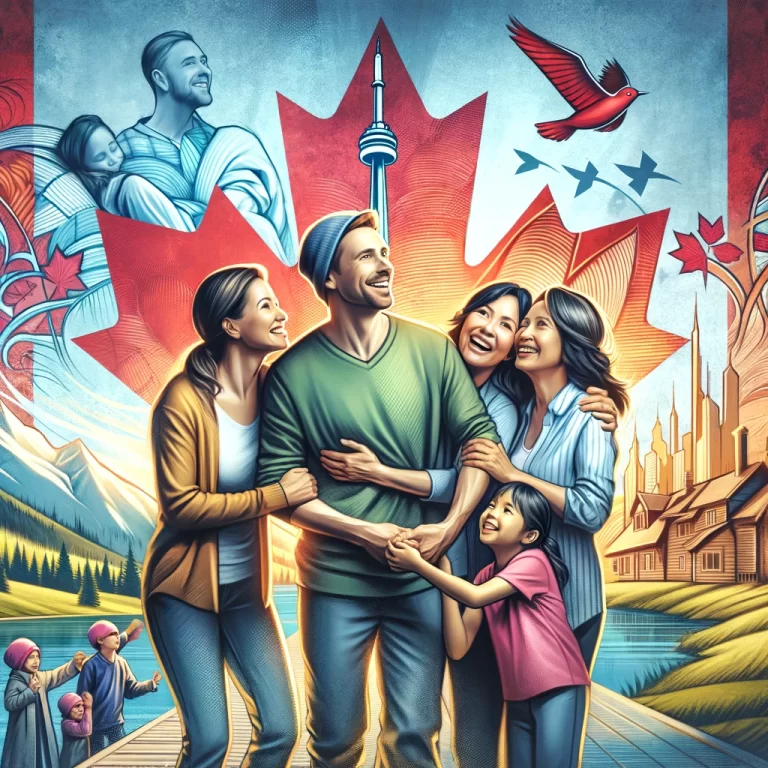Obtaining permanent residency in Canada in 2025 as a healthcare professional

Canada has an urgent need for qualified healthcare professionals, in every province and territory. Whether you're a doctor, a nurse, a medical technologist or even a massage therapist, Canada opens its doors to you with exceptional opportunities. Why so much interest in healthcare professionals? Simply because the Canadian healthcare system is built on solid foundations: skilled, dedicated workers.
If you dream of a brighter future with professional stability, a high quality of life and international recognition, this article is for you. Together, we'll explore the different ways to become a permanent resident in 2025, with a particular focus on Express Entry and new measures targeted at healthcare professionals.
Ready to find out how to turn your dream into reality? Let's dive in!
Understanding the Express Entry system
The system Express entry is the fast and efficient way to immigrate to Canada. Created to attract skilled workers, this system ranks applicants according to a score based on criteria such as age, work experience, language skills and level of education. Here are the main components of this system, and how they apply to you as a healthcare professional.
General operation of the Express Entry system
Express Entry brings together several economic immigration programs. Here is an overview of the most relevant:
Federal Skilled Worker Program (FSWP) :
- Ideal for professionals with qualified international work experience.
- You must meet certain criteria, such as a minimum language score (English or French) and an evaluation of your diplomas to be recognized in Canada.
Federal Skilled Trades Program (FSTP) :
- Designed for skilled trades, it is sometimes applied to technical healthcare professions, such as radiology technologists or paramedical technicians.
- You must have a Canadian job offer or provincial certification.
Canadian Experience Class (CEC) :
- Perfect if you've already worked in Canada for at least a year in a skilled profession, such as nursing or medical technology.
- Experience gained in Canada increases your chances of being selected.
Provincial Nominee Program (PNP) :
- Canadian provinces have their own labour needs. They can appoint qualified candidates, such as healthcare professionals, through Entrée express.
- A provincial appointment almost always guarantees your permanent residence.
Role of targeted invitation rounds for healthcare professionals
Invitation rounds, or "draws", are the key element of the Express Entry system. Applicants with the highest scores in the pool receive an Invitation to Apply for Permanent Residence. But since 2023, a new trend has emerged: targeted invitation rounds.
These draws target specific professions, including healthcare professionals, in response to shortages in this crucial sector. Here's how it works:
General vs. targeted drawings :
- General draws include all qualified candidates, regardless of their profession.
- Targeted draws focus on specific groups, such as the healthcare professionals featured in this article.
Benefits of targeted rounds :
If you are an eligible healthcare professional, you have priority.
These rounds have lower score thresholds, increasing your chances of receiving an invitation.
2024 draws targeting the healthcare professions
In 2024, several rounds were organized specifically for healthcare professionals. These draws enabled thousands of candidates from the healthcare sector to gain permanent residency in Canada.
Here's a table summarizing the invitation rounds specifically targeting health professions (Version 1) in 2024 as part of the Express Entry system:
| No | Date | Round type | Invitations sent | SCG score of lowest-ranked invited candidate |
|---|---|---|---|---|
| 284 | February 14, 2024 | Healthcare professions (Version 1) | 3 500 | 422 |
| 301 | July 5, 2024 | Healthcare professions (Version 1) | 3 750 | 445 |
| 327 | November 20, 2024 | Healthcare professions (Version 1) | 3 000 | 463 |
Analysis of targeted draws
These rounds clearly demonstrate the importance attached to healthcare professionals in Canada's immigration system. With a total of 10250 invitations sent 2024, it's clear that qualified professionals in this sector are in high demand.
In the next section, we'll go into more detail about eligible professions and eligibility criteria to maximize your chances of being selected. Stay tuned!
In short, the Express Entry system, combined with targeted rounds, is a real gas pedal for healthcare professionals wishing to settle in Canada. Whether you're a doctor, nurse or pharmacy technician, your skills are not only in demand, but also rewarded with streamlined processes.
Explaining the popularity and effectiveness of targeted draws for healthcare professionals
Why are these prints so popular?
In recent years, Canada has been facing a significant shortage of healthcare professionals. This is due to a number of factors, including an aging population, increasing demand for medical care and a shortage of qualified workers in key fields. Targeted draws for healthcare professionals respond directly to this urgent need.
Here's why these prints are so popular:
Focus on market needs
Healthcare professions are among the most critical sectors for the well-being of Canadians. By targeting these professions, the government is ensuring that skilled workers arrive quickly to fill vacancies.
Easy for applicants
Targeted draws enable healthcare professionals with lower Global Ranking System (GRS) scores to be invited, increasing their chances of success. For example, a candidate with a score of 422 was selected in February 2024, well below the usual thresholds for general draws.
International recognition of skills
Skilled healthcare professionals are valued worldwide. Canada, with its streamlined immigration system, attracts this talent by offering competitive advantages such as rapid permanent residency and promising career opportunities.
The proven effectiveness of targeted draws
The figures speak for themselves. In 2024, the three targeted rounds for healthcare professions resulted in 10250 applicants receiving an Invitation to Apply (ITA). Here's why this model is particularly effective:
Shorter selection times
By focusing on specific occupations, Canada can process applications more quickly. Targeted candidates know that their skills are in demand, which simplifies the process.
Attracting global talent
By offering a priority pathway, Canada is positioning itself as a destination of choice for healthcare professionals from around the world. This helps maintain a steady flow of highly qualified talent.
Immediate economic and social impact
The health professionals invited through these rounds start work soon after their arrival, bringing rapid solutions to the critical needs of Canadian communities.
What this means for you
If you work in a healthcare profession, these targeted draws represent a unique opportunity. Not only do you have a better chance of receiving an invitation, but you also benefit from a streamlined process that highlights your skills.
In the next section, we'll take a closer look at the eligible professions and their specific criteria. You may discover that your profession is in high demand in Canada!
Eligible professions in detail
If you're a healthcare professional, you'll be delighted to know that several professions are eligible for targeted draws as part of Express Entry. These professions cover a wide range of skills, from doctors and nurses to laboratory technicians and massage therapists. Here's everything you need to know about eligible professions, eligibility requirements and additional criteria.
Table of eligible professions
| Occupation | NOC 2021 Code | TEER Category |
|---|---|---|
| Physician assistants, midwives and paramedical professionals | 31303 | 1 |
| Nurse aides, orderlies and patient service associates | 33102 | 3 |
| Pharmacy technicians and pharmacy assistants | 33103 | 3 |
| Medical laboratory assistants and related technical assistants | 33101 | 3 |
| Audiologists and speech therapists | 31112 | 1 |
| Other health services support staff | 33109 | 3 |
| Other technical personnel in therapy and diagnostics | 32109 | 2 |
| Other alternative practitioners | 32209 | 2 |
| Other professionals in health diagnosis and treatment | 31209 | 1 |
| Chiropractors | 31201 | 1 |
| School information consultants | 41320 | 1 |
| Nursing coordinators and supervisors | 31300 | 1 |
| Dentists | 31110 | 1 |
| Dietitians and nutritionists | 31121 | 1 |
| Occupational therapists | 31203 | 1 |
| Registered nurses and registered psychiatric nurses | 31301 | 1 |
| Practical nurses | 32101 | 2 |
| Nurse practitioners | 31302 | 1 |
| Respiratory therapists, cardiovascular perfusionists and cardiopulmonary technologists | 32103 | 2 |
| Instructors for people with disabilities | 42203 | 2 |
| Kinesiologists and other therapy and diagnostic professionals | 31204 | 1 |
| Massage therapists | 32201 | 2 |
| General practitioners and family physicians | 31102 | 1 |
| Optometrists | 31111 | 1 |
| Ambulance and paramedical staff | 32102 | 2 |
| Physiotherapists | 31202 | 1 |
| Practitioners of traditional Chinese medicine and acupuncturists | 32200 | 2 |
| Psychologists | 31200 | 1 |
| Specialists in surgery | 31101 | 1 |
| Specialists in clinical and laboratory medicine | 31100 | 1 |
| Medical Radiation Technologists | 32121 | 2 |
| Medical laboratory technicians | 32120 | 2 |
| Ultrasound Technologists | 32122 | 2 |
| Therapists in counseling and related specialized therapies | 41301 | 1 |
| Veterinarians | 31103 | 1 |
Specific eligibility requirements
Professional experience required
- You must have accumulated at least six months of continuous full-time (or equivalent part-time) work experience in the last three years.
- This experience may have been acquired in Canada or abroad, as long as it corresponds to one of the eligible professions.
Additional criteria for healthcare professionals
- Evaluation of diplomas: Candidates must have their foreign diplomas evaluated for recognition in Canada.
- Language skills: You must demonstrate a minimum level of proficiency in English or French, usually through recognized tests such as CELPIP, IELTS or TEF Canada.
- Licensing in Canada: Some professions, such as physicians, nurses or physiotherapists, require certification or licensing by a Canadian regulatory body. It's essential to check the specific requirements for your field.
- Adaptability: You earn extra points if you have a validated job offer, family members already in Canada or French language skills.
These professions and criteria show that Canada places a high value on skills in the healthcare field. In the next section, we'll explore other programs that could help you obtain permanent residency, such as immigration to French-speaking or rural communities. Stay with us to discover all the options available!
Other programs and categories
Express Entry is not the only option for healthcare professionals wishing to immigrate to Canada. Several other programs meet specific needs and offer interesting opportunities, especially for those with French language skills or who wish to settle in rural areas. Let's take a closer look.
Immigration in French-speaking communities
Canada values cultural and linguistic diversity, and the government wants to increase the number of French-speaking immigrants outside Quebec. If you're French-speaking and work in a healthcare profession, this could be an ideal path for you.
Why does this program benefit French-speaking healthcare professionals?
- Priority given to Francophones: Francophone communities outside Quebec, particularly in Ontario, Manitoba and New Brunswick, have a growing need for healthcare professionals.
- Community support: These programs help you integrate into communities where your language and culture are valued, which can make the transition easier.
Immigration to rural communities
The Rural Immigration Class is an initiative to attract skilled workers to less densely populated areas of Canada. Healthcare professionals are particularly sought after in these areas.
Benefits of this program :
- Strong local demand : Rural communities often lack essential health services. Doctors, nurses and technicians are in great demand.
- Simplified process : Requirements can be more flexible than in larger urban centers, and some communities offer personalized support for new arrivals.
- Quality of life : Moving to a rural area often means a lower cost of living, beautiful natural surroundings and welcoming communities.
Provincial Nominee Program (PNP) - Outside Express Entry
Each province and territory in Canada has a provincial or territorial portion of the Provincial Nominee Program (PNP) to meet its unique economic and demographic needs. While some PNPs operate through Express Entry, others are independent and offer an alternative route to permanent residency.
Key points for healthcare professionals :
- Provincial nominations: If a province identifies your profession as being in demand (such as physicians or medical technologists), it can nominate you directly for permanent residency.
- Regional adaptation: PCPs allow provinces to target their specific needs. For example, Saskatchewan and British Columbia have specific components for healthcare professionals.
- Fast track to permanent residency: A provincial nomination almost always guarantees your acceptance by the federal government.
Family sponsorship as an alternative
If you have close family already established in Canada, family sponsorship could be a viable option. This program is designed to reunite families, but it can also open up opportunities for qualified professionals.
How it works :
- Who can sponsor? A permanent resident or Canadian citizen may sponsor a family member, such as a spouse or child.
- Advantages: This program doesn't require you to go through the points system or invitation rounds, which can be a simpler alternative.
- Career opportunities: Once sponsored, you can work in your field of expertise, including healthcare.
Why explore these options?
Canada is not limited to a single immigration route. By combining your skills, interests and needs, you can find the program that's right for you. Whether you're a francophone looking to settle in a welcoming community or a medical technologist ready to settle in a rural area, there's an option for you.
In the conclusion, we'll look at why it's crucial to act quickly, and how a regulated Canadian immigration consultant can guide you through the process. Stay tuned!
Conclusion: Seize your opportunity in 2025!
The year 2025 promises to be a strategic time for healthcare professionals wishing to immigrate to Canada. With initiatives such as targeted Express Entry draws, programs for Francophone and rural communities, and support from the provinces, Canada is clearly demonstrating its commitment to welcoming talent in the healthcare field.
However, these opportunities won't last forever. Immigration policies are changing rapidly, and it's essential to seize this opportunity while programs are in place and labor needs are high. The longer you wait, the more likely it is that requirements or priorities will change.
Take the first step today!
Becoming a permanent resident requires careful planning and a thorough understanding of the programs available. Working with our Regulated Canadian Immigration Consultant can make all the difference. He or she will help you :
- Evaluate your eligibility.
- Maximize your chances of success in invitation rounds or other programs.
- Simplify the process so you can focus on what matters: your future.
Contact our immigration consultant now to increase your chances!
Canada needs you, and you deserve to be part of a country that values your skills. Don't let this opportunity pass you by - get started today by completing the free pre-assessment questionnaire, or by making an appointment for your file opening and initial consultation!






